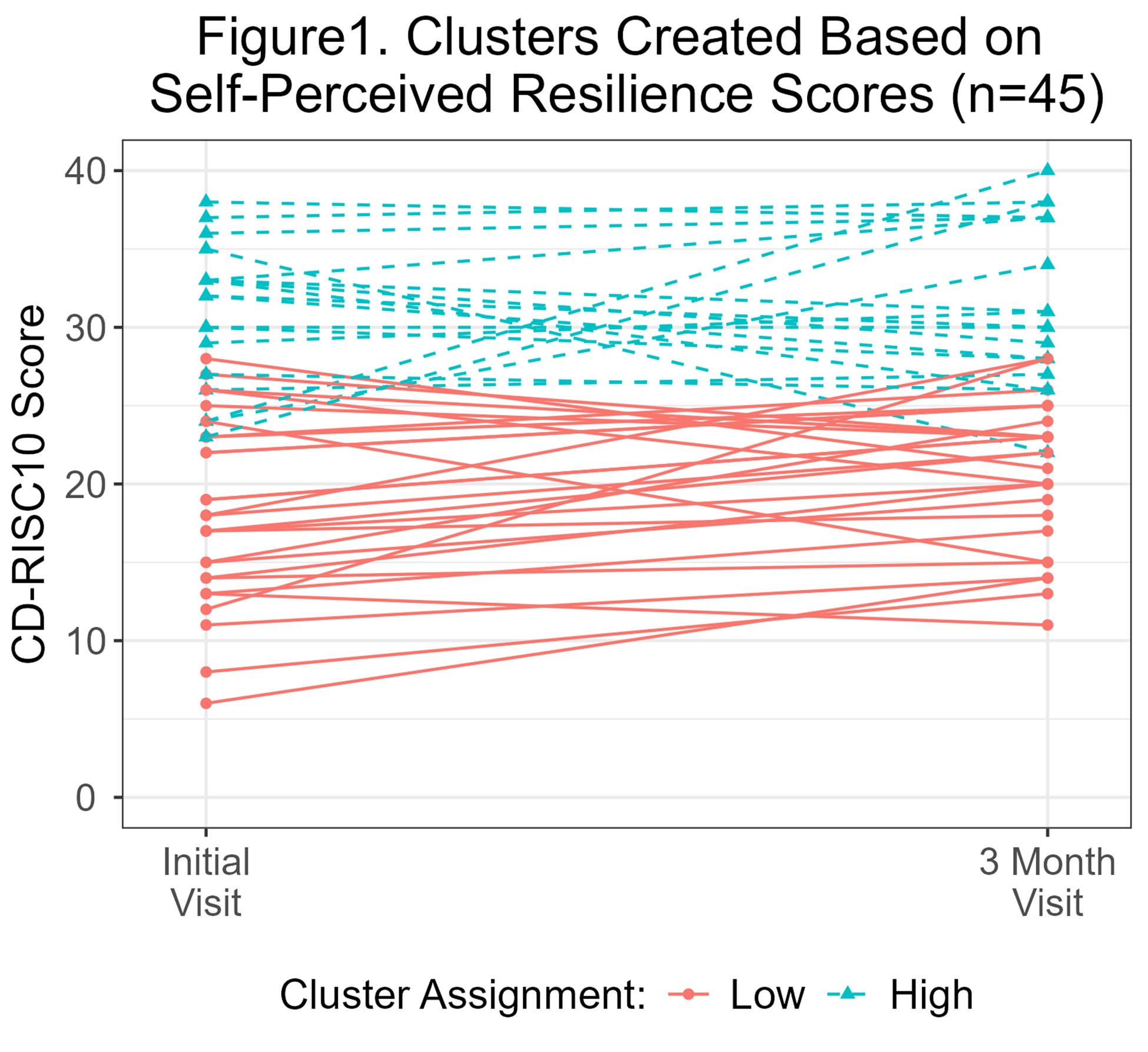Session Information
Session Type: Poster Session B
Session Time: 10:30AM-12:30PM
Background/Purpose: Psychological resilience is low among youth with chronic musculoskeletal pain (CMP) at baseline. We aimed to explore resilience profiles among youth with CMP during the first 3-months after the initial clinic visit and their associations with baseline demographics and clinical characteristics as well as changes in psychosocial outcomes over this interval.
Methods: This was a prospective survey study for youth 12-17 years with CMP. Psychological counseling, and physical and occupational therapy were recommended to all youths. Youth completed electronic surveys, including demographics and self-reported psychosocial factors (resilience, benefit finding, hope, mindfulness, pain catastrophizing, self-efficacy, and pain acceptance) at baseline and 3-months. Abstracted baseline data included clinical characteristics and Patient-Reported Outcomes Measurement Information System (PROMIS) measures (fatigue, peer-relationships, and pain interference). Resilience was measured via the Connor-Davidson Resilience Scale 10-item (CD-RISC-10); scores range 0-40 with higher scores indicating greater resilience. The primary outcome was the longitudinal resilience profiles based on CD-RISC-10 scores at baseline and 3-months identified by K-means clustering, an unsupervised machine learning method and a non-hierarchical cluster analysis technique. We examined differences in baseline demographics, clinical characteristics, and PROMIS measures between clusters using Fisher’s exact, Pearson’s Chi-squared and Wilcoxon rank sum tests, as appropriate. We also explored average within-person changes in psychosocial factors from baseline to follow-up (3-month score minus the initial score) based on cluster.
Results: 45 youths completed the surveys. Median age was 15 (IQR: 14-16) and 87% were female. The number of clusters ranged from 1:5. Based on a within-cluster-sum-of-squares scree plot, the optimal number of clusters was k-2: high (n=18) and low (n=27) resilience clusters (Fig.1). Age, race, ethnicity, and sex were not significantly different between clusters, but those in the low resilience cluster were more likely to have prior and current receipt of counseling (both p < 0.01; Table 1). The low resilience cluster had greater self-reported depression and obsessive-compulsive disorder (both p < 0.05). The low resilience cluster had worse fatigue, peer relationships, pain interference, and pain intensity at baseline (all p < 0.05; Table 1). Within person changes in psychosocial factors from baseline to 3-month follow-up differed by cluster. The high resilience cluster had increased pain self-efficacy but decreased pain acceptance (both p < 0.05; Table 2).
Conclusion: We identified 2 resilience clusters among youth with CMP. Those with lower resilience demonstrated greater symptom severity at baseline. Youth with higher resilience demonstrated greater improvements in self-efficacy within 3 months of initiating treatment but decreased pain acceptance. Further characterization of resilience profiles may provide insight into tailored treatment strategies focusing on self-efficacy and pain acceptance in this patient population.
 CD-RISC-10= Connor-Davidson Resilience Scale 10-item (range 0-40) with higher scores indicating greater self-perceived psychological resilience.
CD-RISC-10= Connor-Davidson Resilience Scale 10-item (range 0-40) with higher scores indicating greater self-perceived psychological resilience.
To cite this abstract in AMA style:
Gmuca S, Leonard J, Tomlinson A, McGill M, Butler N, Xiao R, Cronholm P, Palermo T, Young J, Rosenberg A, Weiss P. Identifying Psychosocial Profiles in Youth with Chronic Musculoskeletal Pain: A K-Means Clustering Analysis of Resilience Subgroups [abstract]. Arthritis Rheumatol. 2025; 77 (suppl 9). https://acrabstracts.org/abstract/identifying-psychosocial-profiles-in-youth-with-chronic-musculoskeletal-pain-a-k-means-clustering-analysis-of-resilience-subgroups/. Accessed .« Back to ACR Convergence 2025
ACR Meeting Abstracts - https://acrabstracts.org/abstract/identifying-psychosocial-profiles-in-youth-with-chronic-musculoskeletal-pain-a-k-means-clustering-analysis-of-resilience-subgroups/

.jpg)
.jpg)